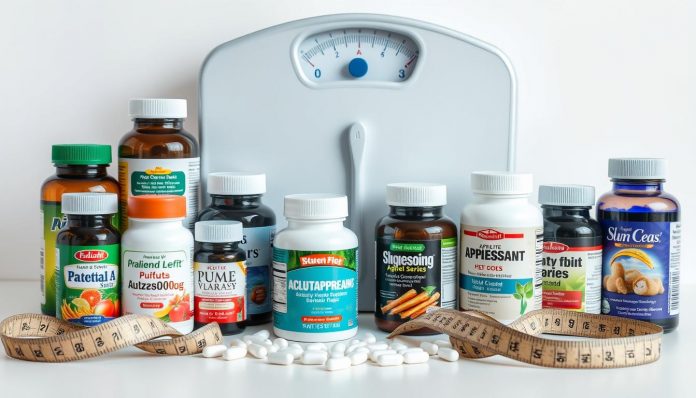Struggling to control your appetite and manage your weight can be tough. Constant cravings make losing weight seem like a big challenge. But, what if there was a simple way to stop those hunger pangs and help your health goals? Welcome to the world of over-the-counter (OTC) appetite suppressants – your ally in the fight against unwanted pounds1.
These non-prescription supplements make you feel fuller for longer. This could lead to eating fewer calories and losing weight. Unlike prescription meds, OTC appetite suppressants are easy to find in stores and online. But are they really effective, and are they safe? Let’s explore how OTC appetite suppressants can help with your weight management.
Table of Contents
Key Takeaways
- Over-the-counter appetite suppressants can help curb hunger and support weight loss efforts
- These supplements often contain natural ingredients like fiber, herbal extracts, and vitamins
- OTC appetite suppressants may be more accessible than prescription weight loss medications
- It’s important to consult with a healthcare professional before using any weight loss supplements
- Combining appetite suppressants with a balanced diet and regular exercise can maximize their effectiveness
Understanding Appetite Suppressants
Appetite suppressants help control hunger and food cravings, aiding in weight loss. They affect hormones and neurotransmitters that regulate hunger. Prescription options like Saxenda and Wegovy are approved for long-term use. Over-the-counter (OTC) options use herbal appetite reducers, metabolism boosters, and energy boosting pills for a milder effect.
What Are Appetite Suppressants?
Appetite suppressants are medications or supplements that reduce hunger and food cravings2. They change the body’s signals for hunger and fullness. This helps people feel fuller and eat fewer calories2. Many people choose OTC options for their ease of access and lower cost.
How Do They Work?
Appetite suppressants use different ways to reduce hunger and increase fullness. Some block hunger signals in the brain, while others slow digestion or increase satiety2. OTC options often include fiber sources, herbal extracts, and vitamins and minerals for mild effects2. But, their effectiveness can vary, and it’s wise to consult a healthcare professional before using them.
“Appetite suppressants can be a useful tool for some individuals, but they should be used with caution and as part of a complete weight management plan that includes a balanced diet and regular exercise.”
3 OTC appetite suppressants are meant for short-term use, 8 to 12 weeks. They’re not for everyone, like those with heart disease, high blood pressure, or diabetes3. Always talk to a healthcare professional before adding any OTC diet aids to your weight loss plan.
| Ingredient | Potential Benefits | Considerations |
|---|---|---|
| Caffeine | May temporarily increase metabolism and suppress appetite | High doses can cause jitteriness, anxiety, and disrupted sleep |
| Glucomannan | Soluble fiber that may promote feelings of fullness | Requires adequate water intake to be effective and avoid digestive issues |
| Green Tea Extract | Contains catechins that may slightly boost metabolism | High doses may cause side effects like headaches or insomnia |
Remember, while OTC appetite suppressants can help, they shouldn’t be the only solution for weight loss. A balanced diet, regular exercise, and lifestyle changes are key for lasting weight management.
Benefits of Over-the-Counter Appetite Suppressants
Over-the-counter (OTC) appetite suppressants offer many benefits for those trying to lose weight. These fat burners, thermogenic supplements, and dietary fiber supplements can reduce hunger and increase feelings of fullness. They also boost metabolism, helping with a calorie-controlled diet and successful weight management.
Supporting Weight Loss Efforts
Research shows that over 40% of people using OTC appetite suppressant Alli lost 5% or more of their body weight in a year4. Those who used Alli, dieted, and exercised lost 5.7 pounds (2.6 kilograms) more in a year than those who only dieted and exercised4. This indicates that OTC appetite suppressants can be a helpful tool in weight loss when part of a complete lifestyle plan.
Improving Energy Levels
Certain ingredients in OTC appetite suppressants, like caffeine, can give a boost of energy. This is great for those who feel tired or have low energy while trying to lose weight. It helps them stay active and stick to their exercise routine.
| Ingredient | Potential Benefits | Recommended Dosage |
|---|---|---|
| Caffeine | Increased energy, enhanced metabolism | Varies, typically 100-300 mg per day |
| Glucomannan (dietary fiber) | Promotes feelings of fullness, supports weight loss | 1-3 grams per day, taken with water |
| Green Tea Extract | Thermogenic properties, antioxidant support | 300-500 mg per day |
While OTC appetite suppressants may not work as well as prescription drugs5, they can be a useful part of a weight management plan. They work best when combined with a healthy diet and regular exercise5. It’s key to have realistic expectations and talk to a healthcare professional before starting these supplements45.
Common Ingredients in Appetite Suppressants
Over-the-counter appetite suppressants often include ingredients that help control hunger and aid in weight management. These include natural solutions, herbal reducers, and dietary fiber supplements.
Fiber Sources
Fiber is key in many appetite-suppressing formulas. Glucomannan, a soluble fiber from the konjac plant, is suggested at 2 to 3 grams daily6. It helps you feel full and satisfied. Women need 25 grams of fiber daily, while men need 38 grams6.
For those over 50, the fiber intake drops. Women should aim for 21 grams, and men for 30 grams6.
Herbal Extracts
Herbal ingredients like green tea, garcinia cambogia, and bitter orange are used in supplements. They may boost metabolism and reduce hunger. Green tea or green tea extract should not exceed 8 cups daily or 338 milligrams per day to avoid liver damage7.
Vitamins and Minerals
Appetite suppressant supplements also include vitamins and minerals for health and energy. Calcium intake varies by age and gender, from 1,000 to 1,200 milligrams daily6. Vitamin D intake is 600 to 800 IU daily6.
The International Society of Sports Nutrition suggests 1.4 to 2.0 grams of protein per kilogram of body weight for athletes6.
Knowing what’s in appetite suppressants helps you choose wisely for weight management. Whether you’re looking for natural solutions, herbal reducers, or fiber supplements, informed choices are key.
“Incorporating a variety of fiber-rich, nutrient-dense foods can be a sustainable approach to appetite management, alongside any supplementation.”
Safety Considerations
When using over-the-counter (OTC) weight loss supplements, it’s important to be careful. These products are usually safe, but they can have side effects that shouldn’t be ignored.8
Common side effects include digestive problems like constipation and nausea. You might also experience headaches, feel tired, or have trouble sleeping8. Some ingredients can also interact with other medicines or worsen health conditions like heart disease8.
Consulting Healthcare Professionals
Always talk to a healthcare professional before starting any new supplement. They can help you understand the risks and benefits. They’ll also suggest the right dosage for you.8 Be sure to tell them about any other medicines or supplements you’re taking8.
The FDA has banned some weight loss ingredients because of serious side effects. These include high blood pressure and heart problems9. So, it’s key to check labels and avoid products with banned substances9.

In summary, be cautious with OTC weight loss supplements and talk to a doctor first. Using them responsibly and under medical guidance can help avoid risks. This way, you can get the most out of them in your weight loss journey.89
Popular Over-the-Counter Options
Many people use over-the-counter (OTC) supplements for natural appetite control and weight loss. These products often include green tea extract, garcinia cambogia, and others. They are thought to help reduce hunger10.
Green Tea Extract
Green tea extract is found in many OTC appetite suppressants. It has catechins and caffeine, which might help with metabolism and hunger10. A study showed that high doses of green tea extract helped 115 women with obesity lose weight10.
Garcinia Cambogia
Garcinia cambogia is also popular for its supposed fat-blocking and appetite-suppressing effects. But, the science on its benefits is not clear-cut2. A study found that those taking Garcinia cambogia lost about 1.94 pounds more than the placebo group2.
Glucomannan
Glucomannan is a dietary fiber that can make you feel full and reduce hunger10. Research indicates it can lead to short-term weight loss of up to 6.6 pounds in some studies2.
Even though these ingredients are in many OTC products, their effectiveness varies. More research is needed to understand their weight loss impact. Always talk to a healthcare professional before adding these supplements to your diet10.
“Appetite suppressants, whether over-the-counter or prescription, should be used as part of a complete weight management plan. This includes a balanced diet and regular exercise.”
| Ingredient | Potential Benefits | Research Findings |
|---|---|---|
| Green Tea Extract | May boost metabolism and suppress appetite | A high dose led to significant weight loss in 115 women with obesity10. |
| Garcinia Cambogia | May block fat production and suppress appetite | Participants lost about 1.94 pounds more than those on a placebo2. |
| Glucomannan | May promote feelings of fullness and suppress appetite | Showed short-term weight loss of up to 6.6 pounds in six studies2. |
While these natural options might help, it’s important to be cautious and seek professional advice10. Supplements like glucomannan can aid in weight loss, but more research is needed to confirm their long-term safety and effectiveness2.
Effectiveness of OTC Appetite Suppressants
Over-the-counter (OTC) weight loss supplements, like appetite suppressants, are everywhere. But, how well do they work? Research on their effectiveness shows mixed results. Some ingredients might help a bit, while others don’t seem to make a difference.
Research and Studies
OTC appetite suppressants haven’t been studied as much as prescription drugs. Yet, some studies have found interesting results. For example, caffeine and green tea’s catechins might help control hunger and aid in weight loss. Also, 5-HTP and more fiber can make you feel fuller and help with weight management.
Prescription drugs like Ozempic and Contrave have stronger evidence of working. People taking Contrave or Wegovy have lost up to 15% of their body weight. This shows that prescription drugs can be more effective.
User Testimonials
User stories can give clues about OTC appetite suppressants’ benefits. But, it’s important to be careful. People’s experiences can differ a lot. Positive results are common, but the science is not always clear.
The best way to lose weight is a mix of appetite suppressants, healthy eating, and exercise. This approach can help you reach and keep your weight loss goals.
| Medication | Average Weight Loss |
|---|---|
| Contrave | 5.4% of initial body weight11 |
| Qsymia | Roughly 10% of starting body weight11 |
| Saxenda | 8.9 to 13.3 pounds after one year11 |
| Phentermine | 43.3% of subjects lost at least 5% of their body weight11 |
| Wegovy | 14.9% of body weight over 68 weeks11 |
“Prescription weight loss medications, such as Ozempic, Contrave, Saxenda, and phentermine-topiramate, are FDA-approved for appetite suppression.”12
The results of OTC weight loss supplements, including appetite suppressants, vary a lot. Some ingredients might offer small benefits, but prescription drugs have stronger evidence. It’s wise to be cautious with OTC options and talk to a doctor before starting any weight loss plan.
Recommended Dosages
When using over-the-counter appetite suppressants and weight loss supplements, it’s important to know the right dosage. Always follow the instructions from the manufacturer and don’t take more than suggested. The right amount depends on the product, its ingredients, and your age and weight.
General Guidelines
Start with the lowest dose and increase it if needed, watching for any side effects. It’s key to use these supplements responsibly and stick to the recommended amounts13.
Age and Weight Considerations
Some products might not be safe for people under 18 or over 65. Also, the dose might change based on your weight. Always talk to a doctor to find the right dose for you14.
“Always start with the lowest effective dose and monitor for any adverse reactions.”
Using over-the-counter appetite suppressants wisely is vital for your weight loss plan. By following the maker’s advice and talking to a doctor, you can use these supplements safely and effectively.
Combining Appetite Suppressants with Diet
To get the best results from weight loss, mix appetite suppressants with a healthy diet. Eat foods rich in nutrients like fruits, veggies, lean proteins, and healthy fats. This helps you feel full and avoid overeating15. Also, some suppressants might affect how your body absorbs nutrients, so a multivitamin might be a good idea.
Importance of Nutritional Balance
It’s key to keep your diet balanced when using appetite suppressants. These products help control hunger but shouldn’t replace a healthy diet. Eating a variety of nutrient-rich foods is important for your health and to avoid nutrient gaps while losing weight.
Meal Planning Tips
- Eat foods high in fiber like whole grains, fruits, and veggies to feel full and support digestion.
- Choose lean proteins like grilled chicken, fish, or tofu to keep muscles strong and satisfied.
- Add healthy fats like avocado, nuts, and olive oil for essential nutrients and to prevent deficiencies.
- Stay away from processed, high-calorie foods that can hinder your weight loss.
- Drink lots of water to stay hydrated and boost metabolism.
By using appetite suppressants with a balanced diet and good meal planning, you can boost your weight loss journey. This approach supports your health and well-being.

Lifestyle Changes to Enhance Effectiveness
Regular physical activity boosts the effects of metabolism boosters and energy pills16. Studies show exercise affects appetite and energy use16. Aim for 150 minutes of moderate exercise weekly for best results.
Drinking enough water is key for appetite suppressants to work well16. A 2018 study showed water before meals can cut calorie intake16. It helps make supplements more effective at controlling hunger.
Incorporating Exercise
Activities like brisk walking, cycling, or strength training boost metabolism and energy16. Combining these with supplements leads to better weight management and health.
Adequate Hydration
Drinking enough water is vital for body functions, including hunger control16. It helps tell the difference between hunger and thirst, preventing overeating.
Adding these lifestyle changes to your routine can make supplements more effective17. Zmyra, a top weight loss supplement, uses natural ingredients for reliable appetite control17.
A balanced diet, regular exercise, and enough water are key for lasting weight loss17. Talk to a healthcare expert to create a plan that fits your needs and goals.
Making Informed Choices
When looking into over-the-counter18 appetite suppressants for weight loss, it’s key to be careful. Always read the labels to know what’s inside, how much to take, and possible side effects18. Be cautious of products that claim too much or promise quick weight loss without lifestyle changes. These claims are often false and may not work as promised.
Reading Labels Carefully
The FDA doesn’t check dietary supplements as closely as medicines18. So, we need to do our homework on the quality and purity of these products. Choose supplements that have been tested by third parties. Make sure they match your health needs and goals.
Avoiding False Claims
While over-the-counter18 appetite suppressants can help with weight management, we should be careful19. None of these products have FDA approval, and their success can vary a lot19. By choosing wisely and talking to health experts, we can use these products safely and effectively.
FAQ
What are appetite suppressants?
How do appetite suppressants work?
What are the benefits of over-the-counter appetite suppressants?
What are the common ingredients in OTC appetite suppressants?
Are there any safety concerns with OTC appetite suppressants?
How effective are OTC appetite suppressants?
What are the recommended dosages for OTC appetite suppressants?
How should I combine appetite suppressants with a healthy diet?
What lifestyle changes can enhance the effectiveness of appetite suppressants?
How can I make informed choices when selecting OTC appetite suppressants?
Source Links
- Appetite Suppressants: What You Should Know
- 12 Over-The-Counter Appetite Suppressants Reviewed
- Should I Use Over-the-Counter Diet Aids?
- Alli weight-loss pill: How does it work and are there risks?
- Is Taking Appetite Suppressants a Good Idea? Here’s What to Know.
- 14 Natural Appetite Suppressants to Curb Hunger and Boost Weight Loss
- 8 Natural Appetite Suppressants That Aid in Weight Loss
- Are Appetite Suppressants Dangerous to My Health?: N. Hasan, MD: Medical Spa
- What to know before you buy weight-loss supplements
- Best appetite suppressants: Types, side effects & more
- Your Complete Guide to Weight-Loss Pills
- Do Appetite Suppressants Work?
- 10 Best Appetite Suppressant Pills for Appetite Control & Hunger Cravings – International Society of Nephrology (ISN)
- Phentermine (oral route)
- Appetite Suppressants and Eating Disorders
- 10 ways to suppress appetite
- Best Appetite Suppressants: Top 5 Effective Options for Weight Management
- Strongest Appetite Suppressants OTC: 9 Top Choices for Effective Weight Management | Breaking AC
- Appetite Suppressants: Do They Actually Work? | Ro












